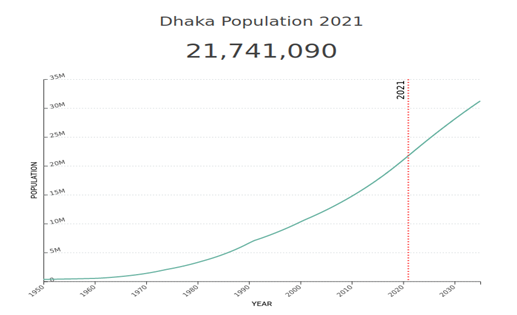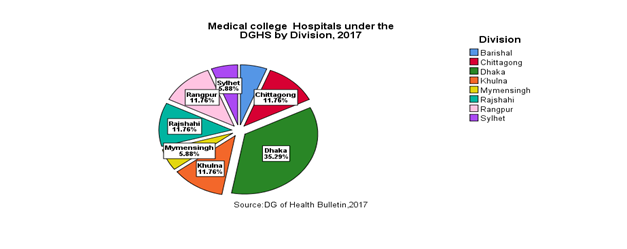Mandatory Decentralisation Required in Our Health and Education System
Sadia Afrin | 14 February 2021
I once dreamt that no ambulance was rushing towards Dhaka from rural areas, and no students were flocking to the capital for better educational institutions. When I woke up, I felt like it was a mirage. But I still believe in the quote by the former US president, Barack Obama: “Change is never easy, but always possible.”
Bangladesh is a densely populated country with a myriad of problems. Dhaka has the highest population density, followed by some other cities.

Fig: Dhaka population increment as the year passes
Traffic jams, air pollution, and sound pollution are major problems, mainly in the capital. Several studies have shown that Dhaka is the second-most polluted city in the world. One reason for this is that Dhaka is, intentionally or unintentionally, becoming the centre of all activities in Bangladesh, and no steps have been taken to mitigate this alarming issue.
35.29 percent of medical college hospitals are located in Dhaka. Health workers are concentrated in urban secondary and tertiary hospitals, although 70 percent of the population lives in rural areas (Country Case study, GHWA, 2008).

Every day, a vast number of people from surrounding areas rush towards Dhaka for better treatment. We can take for example a situation where someone’s relative suffers a heart attack. Their community clinic doctor might refer them to an experienced doctor who works at a hospital in Dhaka city. There’s a high chance the people would be stuck in traffic and be unable to reach the hospital in time, causing a tragic death on the road. Countless cases such as this are occurring on the daily. However, there might be a solution to this. If there are medical colleges and hospitals in each district of Bangladesh with qualified doctors and necessary equipment, nobody will need to travel to Dhaka for treatment. As a result, many lives will be saved just by cutting down on time wasted sitting in traffic. The overly-centralised healthcare system that exists is one of the causes of Dhaka city becoming overcrowded, and we are the victims of this centralisation.
Our education system is also a victim of centralisation. Every rural student considers urban students as the standard. They always feel that they lag behind the capital’s renowned institutions’ students and do not get the best teachers. Since everything is centralised in Dhaka city, teacher recruitment and allocation is not carried out correctly. For this reason, every rural student dreams of being admitted into a reputed institution of Dhaka. The number of families or students shifting from rural areas to Dhaka to get a better education is staggering. After the HSC examination, a large number of students travel to Dhaka for university admission purposes. When asked about their preference for choosing an institute, they usually answer with BUET, Dhaka University, Jahangirnagar University, Jagannath University, Dhaka Medical College and Hospital – all of which are centred in Dhaka. The reason behind this is that they know they will get the best teachers and all added benefits by studying in Dhaka. The solution could be to have all educational institutions of our country have teachers with the same qualifications and the same use of modern technology and facilities.
Dhaka University appoints graduates with high CGPA as their teachers, so other public university students lag behind and do not get the benefits of educational advancement properly. Many of the top organisations in Bangladesh mention in their circulars the names of the institutions from which the candidates should have graduated. This is discriminatory and shows that opportunities are not distributed equally.
For the best of our country we need to get out of this Dhaka cantered faith. Here only two problems has been focused out of hundreds .Government should take immediate action before it become unsolvable. Our Prime Minister Sheikh Hasina has stated that our government has undertaken a plan to decentralise Bangladesh within 2041 and hopes that this plan will work effectively. Without decentralisation, life is becoming so tough in the capital city and the city getting unliveable day by day.
Sadia Afrin, Research Intern, Centre for Governance Studies(CGS). .
Views in this article are author’s own and do not necessarily reflect CGS policy.
